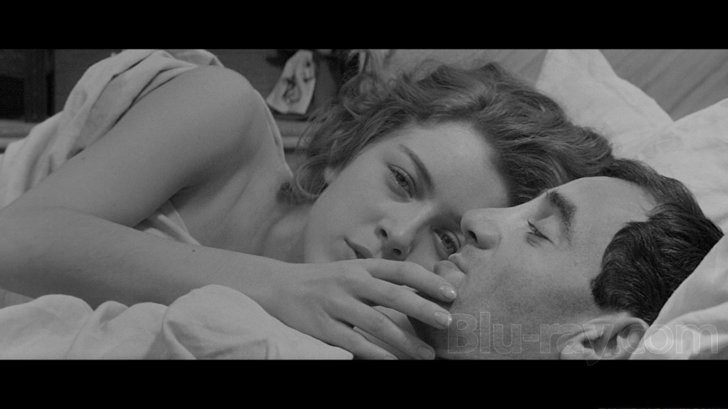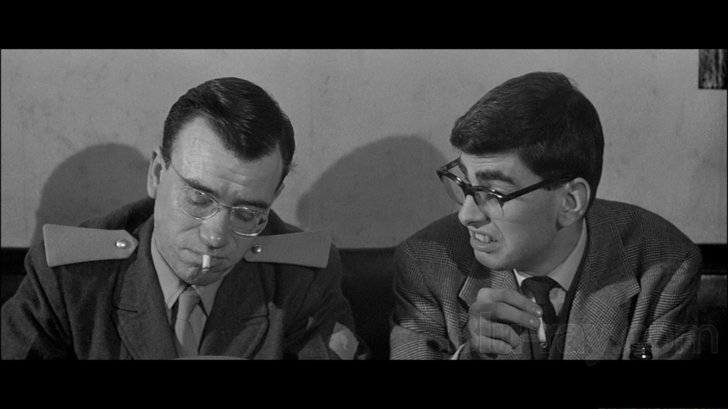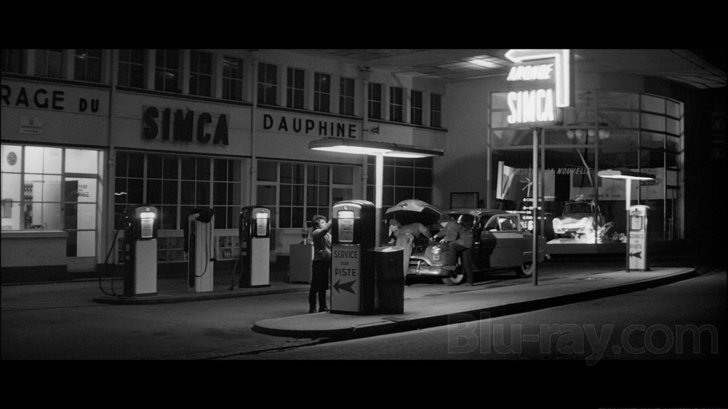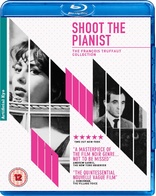Shoot the Pianist Blu-ray Movie
HomeShoot the Pianist Blu-ray Movie 
Tirez sur le pianiste / Shoot the Piano PlayerArtificial Eye | 1960 | 82 min | Rated BBFC: 12 | Jul 28, 2014
Movie rating
7.6 | / 10 |
Blu-ray rating
| Users | 0.0 | |
| Reviewer | 4.5 | |
| Overall | 4.5 |
Overview
Shoot the Pianist (1960)
Charlie Kohler is a piano player in a bar. The waitress Lena is in love with him. One of Charlie's brother, Chico, a crook, takes refuge in the bar because he is chased by two gangsters, Momo and Ernest. We will discover that Charlie's real name is Edouard Saroyan, once a virtuose who gives up after his wife's suicide.
Starring: Charles Aznavour, Marie Dubois (I), Nicole Berger (I), Michèle Mercier, Serge DavriDirector: François Truffaut
| Foreign | Uncertain |
| Drama | Uncertain |
| Romance | Uncertain |
| Crime | Uncertain |
| Comedy | Uncertain |
| Thriller | Uncertain |
Specifications
Video
Video codec: MPEG-4 AVC
Video resolution: 1080p
Aspect ratio: 2.34:1
Original aspect ratio: 2.35:1
Audio
French: LPCM 2.0
Subtitles
English
Discs
25GB Blu-ray Disc
Single disc (1 BD)
Playback
Region B (locked)
Review
Rating summary
| Movie | 4.5 | |
| Video | 4.0 | |
| Audio | 5.0 | |
| Extras | 4.0 | |
| Overall | 4.5 |
Shoot the Pianist Blu-ray Movie Review
Reviewed by Dr. Svet Atanasov July 31, 2014François Truffaut's "Shoot the Piano Player" a.k.a. "Tirez sur le pianiste" (1960) arrives on Blu-ray courtesy of British distributors Artificial Eye. The supplemental features on the disc include an original trailer for the film; introduction by Serge Toubiana, president of Cinémathèque française; Marie Dubois screen tests; and an audio commentary by legendary cinematographer Raoul Coutard. In French, with optional English subtitles for the main feature. Region-B "locked".

"What were you thinking when we walked together in the street, last night?"
Shoot the Piano Player is based on David Goodis’ novel “Down There”, but it was inspired by Jean-Luc Godard’s work. Francois Truffaut completed it in 1960, a year after he won Best Director Award for his first feature film, The 400 Blows, at the Cannes Film Festival.
The film follows closely Charlie Kohler (Taxi for Tobrouk, The Adventurers), a brilliant but disillusioned pianist who works in a noisy bar somewhere on the outskirts of Paris. He is single but regularly makes love to his former mistress, a beautiful prostitute named Clarisse (Michele Mercier, Angelique), who helps him take care of his adolescent brother Fido (Richard Kanayan). The seemingly stable rhythm of Charlie’s life is disrupted when his brother Chico (Albert Remy, Les Enfants du Paradis) suddenly appears and reveals to him that he is chased by two gangsters (Claude Mansard & Daniel Boulanger) determined to teach him a lesson he won’t forget. Before Charlie can figure out how to help Chico, he finds himself right in the middle of a serious dispute which he does not fully understand. Meanwhile, the beautiful waitress Lena (Marie Dubois, Jules & Jim, The Thief of Paris), who likes spending time with Charlie, discovers that he was once a successful concert pianist and urges him to leave the bar and rebuild his career. However, Lena’s affection for Charlie seriously angers the bar’s jealous owner, Plyne (Serge Davri, Borsalino & Co), and he decides to put the pianist out of his misery.
Shoot the Piano Player could be somewhat difficult to follow because its story uses as a foundation a series of uneven flashbacks. Additionally, different characters regularly appear in front of the camera and then suddenly disappear without a trace, frequently leaving one uncertain what their exact role is.
The hectic tempo, however, is what gives Shoot the Piano Player its identity. Indeed, with the exception of Charlie it feels like its characters are simply rushing through it on their way to a completely different film, where they would relax and be themselves. Unsurprisingly, when they bump into each other and realize that they don’t belong together they become either seriously confused or frustrated and often react in very unusual ways. These awkward encounters are essentially what give Shoot the Piano Player its flavor and make it so fascinating to behold.
Because at its core Shoot the Piano Player is very much an experimental film -- it was Truffaut’s first film with the legendary Nouvelle Vague cinematographer Raoul Coultard and both were eager to experiment with unconventional shooting techniques -- the film’s framing, lighting and editing are very unique. For example, the entire film was shot in natural settings and primarily with natural light. As a result, there are some quite drastic fluctuations in terms of contrast and clarity between different sequences. (Compare the opening noirish sequence, which was shot with cheap reflecting lamps and as a result there is so little light that the faces of Chico and his accomplice are impossible to see, with the classically lit bedroom sequence, where Charlie and Clarisse are seen in bed). Truffaut also tried new sound designs, but many of the recording experiments actually produced serious synchronization issues. (Boby Lapointe’s improvizations in the bar, for instance, created all sorts of different problems for Truffaut and Coultard).
The best way to describe the acting is to say that it is different. Some of it is unusually relaxed and obviously very convincing, but elsewhere it is so intense and so over the top that it looks borderline amateurish -- and yet in this film these contrasting styles actually feel right.
The film’s legendary soundtrack was created by the great Georges Delerue (Jean Becker's One Deadly Summer, Louis Malle's Viva Maria!).
Shoot the Pianist Blu-ray Movie, Video Quality 

Presented in an aspect ratio of 2.34:1, encoded with MPEG-4 AVC and granted a 1080p transfer, François Truffaut's Shoot the Piano Player arrives on Blu-ray courtesy of British distributors Artificial Eye.
Depth, clarity and contrast frequently fluctuate, but all of these fluctuations are part of the film's original cinematography. For example, take a look at screencaptures #6 and 7 and notice how the lack of light makes it virtually impossible to see the faces of the two protagonists. The flatness is a byproduct of the poor lighting equipment François Truffaut and Raoul Coutard had to use while shooting the sequence. (There are very specific comments addressing the sequence in the audio commentary by Raoul Coutard). Elsewhere depth can quickly fluctuate as well, but contrast stability is far better (see screencapture #19). Once again, however, this is an inherited source limitation. When there is plenty of natural light, or proper lighting, depth and clarity are very pleasing (see screencapture #5). Generally speaking, the blacks, white, and grays are well balanced, but because different equipment was used to shoot select sequences at times the grays can temporarily destabilize the blacks. Furthermore, there are no traces of problematic degraining corrections. There are a couple of sequences where I noticed traces of light sharpening popping up, but they never become distracting. Overall image stability is outstanding. There are no large damage marks, cuts, debris, scratches, or stains. Lastly, there are no encoding anomalies to report in this review. All in all, this is a very strong presentation of Shoot the Piano Player that should please its fans. (Note: This is a Region-B "locked" Blu-ray release. Therefore, you must have a native Region-B or Region-Free PS3 or SA in order to access its content).
Shoot the Pianist Blu-ray Movie, Audio Quality 

There is only one standard audio track on this Blu-ray release: French LPCM 2.0. For the record, Artificial Eye have provided optional English subtitles for the main feature. When turned on, they appear inside the image frame.
There are some minor clarity fluctuations, but they are part of the film's original sound design. In fact, these types of fluctuations are fairly common in many of the classic Nouvelle Vague films (see Jules & Jim). Georges Delerue's legendary score is well rounded and enhances key sequences of the film, as intended. There is no problematic background hiss, crackle, audio dropouts, or distortions to report in this review. The English translation is excellent.
Shoot the Pianist Blu-ray Movie, Special Features and Extras 

- Presentation with Serge Toubiana - Serge Toubiana, president of Cinémathèque française, introduces Shoot the Piano Player. In French, with optional English subtitles. (4 min).
- Trailer - original trailer for Shoot the Piano Player. In French, with optional English subtitles. (2 min).
- Audio Commentary - I consider this audio commentary with Raoul Coutard to be one of the ten best ever done for a home video release, right next to the one Michael Cimino's did years ago for The Deer Hunter. The legendary cinematographer explains in detail how key sequences from the film were shot, and discusses the important differences and similarities between Francois Truffaut and Jean-Luc Godard's directing styles, the specific qualities of the 'classic system' the Nouvelle Vague directors attacked with their films, the significance of the Cahiers du Cinema group, the important roles the legendary producers Georges de Beauregard and Pierre Braunberge had during '60s, Francois Truffaut's maturation as a director, etc. The commentary was produced by MK2 in France and initial appeared on local French releases of the film. It does not appear on Criterion's R1 DVD release of Shoot the Piano Player. In French, with optional English subtitles.
- Marie Dubois Screen Tests - in French, with optional English subtitles. (3 min).
Shoot the Pianist Blu-ray Movie, Overall Score and Recommendation 

Francois Truffaut's Shoot the Piano Player is rightfully considered one of the definitive Nouvelle Vague films. Indeed, even today its desire to be different and break as many conventional rules as possible immediately separates it from the bulk of the films that are being produced. Artificial Eye's technical presentation of Shoot the Piano Player is very good. More importantly, included with this release is MK2's superb audio commentary with the great cinematographer Raoul Coutard, which I consider to be one of the ten best ever done for a home video release. HIGHLY RECOMMENDED.
Similar titles
Similar titles you might also like

Anne & Muriel
Les deux Anglaises et le continent / Two English Girls
1971

A Gorgeous Girl Like Me
Une belle fille comme moi / A Beautiful Girl Like Me
1972

The Woman Next Door
La Femme d'à côté
1981

Finally, Sunday
Vivement dimanche! / Confidentially Yours
1983

The Soft Skin
La peau douce
1964

Une Femme est une Femme
A Woman Is a Woman / Godard: The Essential Collection
1961

Stolen Kisses
Baisers volés
1968

Pierrot le Fou
StudioCanal Collection
1965

Jules and Jim
Jules & Jim / Jules et Jim
1962

Classe Tous Risques
The Big Risk
1960

Subway 4K
1985

The Last Metro
Le dernier métro
1980

Casque d'Or 4K
Golden Marie / Vintage World Cinema
1952

36
36 Quai des Orfèvres / 36th Precinct
2004

Diva 4K
Vintage World Cinema
1981

The Night is Young
Mauvais Sang
1986

Le Quai Des Brumes
Port of Shadows / Vintage World Cinema
1938

Bed & Board
Domicile conjugal
1970

Love on the Run
L'amour en fuite
1979

Le Cercle Rouge
Vintage World Cinema
1970
